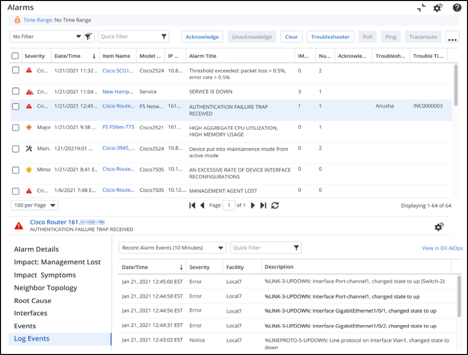September 19, 2024

DX NetOps Accelerates Triage, Delivering Contextual Access to Syslog

Written by: Yann Guernion
|
Key Takeaways
|
|
Network operations teams face challenges in managing modern, multi-vendor networks due to the need to collect and analyze data from various sources. Teams need to work with logs, events, and metrics, and this data is often scattered across different tools and locations. This fragmentation leads to inefficiency and complexity, as operators must switch between tools and interfaces to troubleshoot issues.
Fragmented visibility
Most network teams rely on tools that operate in isolation, instead of collectively delivering the observability required to manage today’s complex networks. For instance, when troubleshooting, an operator shouldn’t have to connect directly to a specific device to access its logs and diagnose the issue. Instead, the troubleshooting workflow should seamlessly integrate with standard operating procedures, streamlining the process and minimizing the steps needed to resolve the problem efficiently.
Managing SNMP traps and Syslog events often highlights a similar disconnect, as these protocols operate independently rather than in concert. For example, network teams may receive an SNMP trap indicating a critical device failure. However, to fully understand the context, they must manually search through Syslog events residing on different systems. These disjointed approaches delay the identification and resolution of issues. Related alerts and logs should be correlated through a unified workflow that requires fewer clicks and enables faster decisions.
Where the story begins
SNMP was developed in the late 80s to address the need for a standardized method to monitor and manage network devices. SNMP facilitates communication between a central management platform and network devices by using a simple client-server protocol and a hierarchical database, known as the management information base (MIB), which contains object definitions. SNMP can also send "traps,” which are notifications from network devices, whenever predefined conditions occur, such as a device failure.
Syslog was also created in the 80s as part of the Unix operating system and became a standard logging tool due to its simplicity. Syslog allows operating system services and applications to log messages in a uniform format, which can be monitored and analyzed by system administrators.
Both SNMP and Syslog continue to be relevant today despite the development of newer protocols. They play collaborative roles in network management, with SNMP remaining a go-to for predefined events, while Syslog’s flexibility makes it ideal for conveying unexpected alert payloads.
Disjointed ecosystem
Over time, organizations have invested heavily in specialized platforms that handle SNMP traps and Syslog events separately. This makes it less likely that a single platform would replace existing implementations. Exacerbating matters is that SNMP and Syslog are typically managed by distinct teams, with Syslog traditionally managed by application- or system-focused groups. As a result, network operations center (NOC) teams confront several significant challenges in gaining access to Syslog data:
- Limited access. Level one operators often lack direct access to Syslog management platforms, delaying the retrieval of critical information.
- Manual handovers. Manual processes for obtaining and correlating Syslog data introduce errors and increase the risk of losing context during handovers between teams.
- Context fragmentation. Level two engineers struggle with maintaining a comprehensive view of network issues, as they need to switch between tools for accessing Syslog data, performance metrics, and alarms.
Contextual access to Syslog with DX NetOps
Broadcom has significantly upgraded DX NetOps to address these challenges. The solution now features contextual Syslog monitoring that integrates with Splunk and Elastic. This enhancement optimizes operational workflows and accelerates the identification, triage, and resolution of network issues.
When operators engage with DX NetOps alarm views to triage issues, the solution can seamlessly retrieve Syslog entries from Splunk or Elastic based on the alarm’s occurrence time. Additionally, optional filtering capabilities are available to refine searches based on specific message patterns. If the troubleshooting involves a particular device, the integration enables the efficient fetching of Syslog messages for designated timeframes and presents the information directly on the device context page.

DX NetOps displays Syslog entries in the context of an alarm.
Through its integration with Splunk and Elastic, DX NetOps reduces manual, time-consuming efforts and optimizes collaboration within the NOC, while leveraging existing investments. By streamlining monitoring workflows, network specialists can overcome the challenges associated with poor Syslog access and improve the reliability of network services within complex environments.
Drawing it all together
As network environments continue to grow more complex, the demand for cohesive and integrated monitoring tools becomes critical. The traditional separation between SNMP and Syslog has led to inefficiencies, fragmented workflows, and slow issue resolution for network teams. By introducing contextual Syslog monitoring capabilities in DX NetOps, Broadcom demonstrates its commitment to delivering sustained innovation to its installed base. The integration with Splunk and Elastic improves operational efficiency and ensures faster, more accurate troubleshooting. As a result, network specialists can maintain higher levels of service reliability, while maximizing the value of existing monitoring platform investments.
Seamless Syslog integration, seamless upgrade
Existing DX NetOps customers can experience seamless Syslog integration, without additional license costs. Simply install the latest version to unlock this feature. Also, don’t miss our complimentary Designated Weekend Upgrade Program, which helps ensure you can upgrade DX NetOps with confidence and convenience.

Yann Guernion
Yann has several decades of experience in the software industry, from development to operations to marketing of enterprise solutions. He helps Broadcom deliver market-leading solutions with a focus on Network Management.
Other resources you might be interested in
Automic Automation Cloud Integrations: Google Cloud Run Agent Integration
Broadcom's Google Cloud Run Automation Agent lets you easily execute Google Cloud Run jobs, monitor and manage them with your existing enterprise workload automation, as well as other cloud-native...
Rally Office Hours: February 19, 2026
Learn more about Rally's AI capabilities, including the upcoming MCP server and built-in features, plus follow a Q&A session and upcoming event announcements.
Clarity 101 - From Strategy to Reality
Learn how Clarity helps you achieve Strategic Portfolio Management.
Working with Custom Views in Rally
This course introduces you to working with custom views in Rally.
Rally Office Hours: February 12, 2026
Catch the announcement of the new Rally feature that enables workspace admins to set artifact field ordering. Learn about ongoing research and upcoming events.
The Architecture Shift Powering Network Observability
Discover how NODE (Network Observability Deployment Engine) from Broadcom delivers easier deployment, streamlined upgrades, and enhanced stability.
Rally Office Hours: February 5, 2026
Learn about new endorsed widgets and UX research needs, and hear from the Rally team about key topics like user admin, widget conversion, custom grouping, Slack integration, and Flow State filtering.
AppNeta: Design Browser Workflows for Web App Monitoring
Learn how to design, build, and troubleshoot Selenium-based browser workflows in AppNeta to reliably monitor web applications and validate user experience.
DX NetOps: Time Zone and Business Hours Configuration and Usage
Learn how to set and manage time zones and business hours within DX NetOps Portal to ensure accurate data display and optimize analysis and reporting.